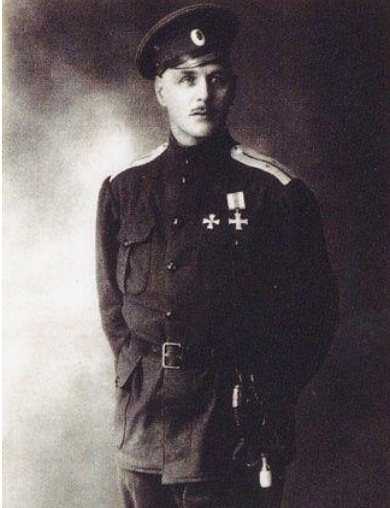
Lieven Anatolii Pavlovich (1872–1937)
Lieven Anatolii Pavlovich
Source
Source
Anatolii Lieven was born on November 28, 1872 in St. Petersburg in an old noble family. Both his grandfather and father served in the Russian life-guard. Anatolii Lieven graduated from the law faculty of St. Petersburg University and the military college and later also served in the life-guard. In 1908, Lieven left the army and took up farming on his family estate in Mezotne. With the outbreak of the First World War, Anatolii Lieven returned to the army and went to the front. He rose to the rank of captain during the war.¹
After the Revolution, the Bolsheviks arrested Lieven only in the beginning of 1918. However, after the signing of the Brest Peace Treaty on March 3, 1918, they released him as a Courland province native, which was going to be a separate state. Lieven returned to the Baltic and in January 1919, he formed a Russian volunteer detachment in Libava (Liepaja). These forces became part of the General Yudenich’s white army. In April 1919, Lieven was offered to head the government in Latvia after the anti-Bolshevik coup, but he refused and stayed in the white army. His forces fought for Mitava and on May 22, 1919, together with the German troops of General von der Goltz, took Riga. Shortly after Lieven was seriously wounded in battle, but later he ended up with his unit in Yudenich’s army, where he rose to the rank of major general.²
After the Revolution, the Bolsheviks arrested Lieven only in the beginning of 1918. However, after the signing of the Brest Peace Treaty on March 3, 1918, they released him as a Courland province native, which was going to be a separate state. Lieven returned to the Baltic and in January 1919, he formed a Russian volunteer detachment in Libava (Liepaja). These forces became part of the General Yudenich’s white army. In April 1919, Lieven was offered to head the government in Latvia after the anti-Bolshevik coup, but he refused and stayed in the white army. His forces fought for Mitava and on May 22, 1919, together with the German troops of General von der Goltz, took Riga. Shortly after Lieven was seriously wounded in battle, but later he ended up with his unit in Yudenich’s army, where he rose to the rank of major general.²
After the end of the main Civil War campaigns in the North Russia and the failure of the white movement, he left for his native Mezotne estate (Mezotten). In 1921, in Berlin, he founded the organization “The Brotherhood of Russian Truth” together with Ataman Pyotr Krasnov, writer Sergei Sokolov, Duke Georgii Leuchtenberg and Alexander Amfitheatrov. Anatolii Lieven headed this organization from 1932 to 1934.³ He also took part in pro-monarchist activities of the Russian emigrants: he took part in the Reichengall Monarchist Congress, headed the Society for Mutual Aid of Servicemen in Latvia, supported the Russian Falcon (‘Russky Sokol’) sports society, and was a member of the Committee for the publication of the history of the reign of Emperor Nicholas II. He also was the plenipotentiary representative of the Grand Duke Nicholas Nikolaevich in Riga and a member of the ROVS leadership in Latvia. Lieven collaborated with the anti-communist Aubert League, which was headed by Yurii Lodyzhenskii. Anatolii Pavlovich Lieven died on April 3, 1937 in Kemeri, near Riga, and was buried in the family estate in Mezotne.

Content Oriented Web
Make great presentations, longreads, and landing pages, as well as photo stories, blogs, lookbooks, and all other kinds of content oriented projects.
[1] Gurin, Aleksandr. 'Anatoliy Liven'. Russkiye Latvii , 2010. https://www.russkije.lv/ru/lib/read/a-liven.html
[2] Gagkuyev, Ruslan, Vasiliy Tsvetkov, and Vasiliy Golitsyn. General Kutepov . Moskva: Posev, 2009.
[3] Bazanov, Petr. Bratstvo Russkoy Pravdy - samaya zagadochnaya organizatsiya Russkogo Zarubezh'ya . Moskva: Posev, 2013.
[2] Gagkuyev, Ruslan, Vasiliy Tsvetkov, and Vasiliy Golitsyn. General Kutepov . Moskva: Posev, 2009.
[3] Bazanov, Petr. Bratstvo Russkoy Pravdy - samaya zagadochnaya organizatsiya Russkogo Zarubezh'ya . Moskva: Posev, 2013.